
It’s Friday.
President Shitshow’s public schedule for…
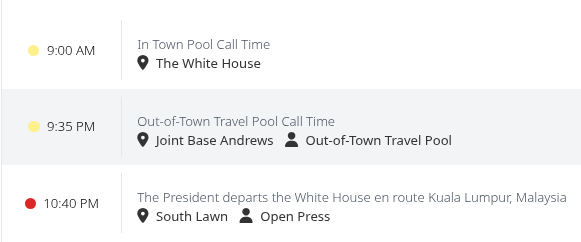
Baby’s First Trade War is toddling off to Malaysia to talk trade while the government stays closed. After he torched talks with Canada because his feelings got poked by archival footage, he’s now off to show Southeast Asia the full fury of a man who thinks tariffs are a toy hammer that can fix anything he hits.
First he rage-posted this at 10:39 PM ET:
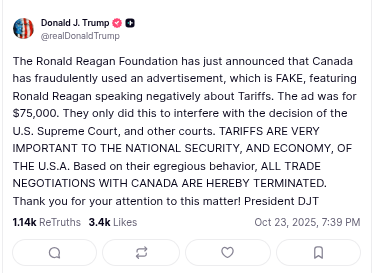
Then he deleted it and reposted the same tantrum at 11:13 PM ET, but this time with the Reagan Foundation providing emotional support:
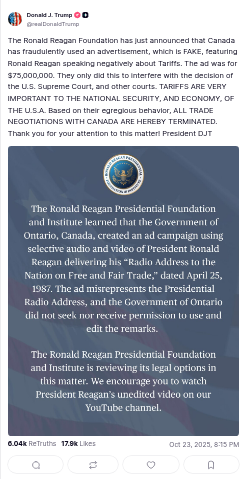
If you think I’m joking when I say he needs adult supervision to throw a fit, Exhibit B is right here: he literally dragged Ronald Reagan’s ghost into the argument like a kid tattling to Grandpa.
Let’s roll the tape Grandpa Reagan left behind in April 1987, back when tariffs were the bad idea everyone agreed on:
My fellow Americans:
Prime Minister Nakasone of Japan will be visiting me here at the White House next week. It’s an important visit, because while I expect to take up our relations with our good friend Japan, which overall remain excellent, recent disagreements between our two countries on the issue of trade will also be high on our agenda.
As perhaps you’ve heard, last week I placed new duties on some Japanese products in response to Japan’s inability to enforce their trade agreement with us on electronic devices called semiconductors. Now, imposing such tariffs or trade barriers and restrictions of any kind are steps that I am loath to take. And in a moment I’ll mention the sound economic reasons for this: that over the long run such trade barriers hurt every American worker and consumer. But the Japanese semiconductors were a special case. We had clear evidence that Japanese companies were engaging in unfair trade practices that violated an agreement between Japan and the United States. We expect our trading partners to live up to their agreements. As I’ve often said: Our commitment to free trade is also a commitment to fair trade.
But you know, in imposing these tariffs we were just trying to deal with a particular problem, not begin a trade war. So, next week I’ll be giving Prime Minister Nakasone this same message: We want to continue to work cooperatively on trade problems and want very much to lift these trade restrictions as soon as evidence permits. We want to do this, because we feel both Japan and the United States have an obligation to promote the prosperity and economic development that only free trade can bring.
Now, that message of free trade is one I conveyed to Canada’s leaders a few weeks ago, and it was warmly received there. Indeed, throughout the world there’s a growing realization that the way to prosperity for all nations is rejecting protectionist legislation and promoting fair and free competition. Now, there are sound historical reasons for this. For those of us who lived through the Great Depression, the memory of the suffering it caused is deep and searing. And today many economic analysts and historians argue that high tariff legislation passed back in that period called the Smoot-Hawley tariff greatly deepened the depression and prevented economic recovery.
You see, at first, when someone says, “Let’s impose tariffs on foreign imports,” it looks like they’re doing the patriotic thing by protecting American products and jobs. And sometimes for a short while it works — but only for a short time. What eventually occurs is: First, homegrown industries start relying on government protection in the form of high tariffs. They stop competing and stop making the innovative management and technological changes they need to succeed in world markets. And then, while all this is going on, something even worse occurs. High tariffs inevitably lead to retaliation by foreign countries and the triggering of fierce trade wars. The result is more and more tariffs, higher and higher trade barriers, and less and less competition. So, soon, because of the prices made artificially high by tariffs that subsidize inefficiency and poor management, people stop buying. Then the worst happens: Markets shrink and collapse; businesses and industries shut down; and millions of people lose their jobs.
The memory of all this occurring back in the thirties made me determined when I came to Washington to spare the American people the protectionist legislation that destroys prosperity. Now, it hasn’t always been easy. There are those in this Congress, just as there were back in the thirties, who want to go for the quick political advantage, who will risk America’s prosperity for the sake of a short-term appeal to some special interest group, who forget that more than 5 million American jobs are directly tied to the foreign export business and additional millions are tied to imports. Well, I’ve never forgotten those jobs. And on trade issues, by and large, we’ve done well. In certain select cases, like the Japanese semiconductors, we’ve taken steps to stop unfair practices against American products, but we’ve still maintained our basic, long-term commitment to free trade and economic growth.
So, with my meeting with Prime Minister Nakasone and the Venice economic summit coming up, it’s terribly important not to restrict a President’s options in such trade dealings with foreign governments. Unfortunately, some in the Congress are trying to do exactly that. I’ll keep you informed on this dangerous legislation, because it’s just another form of protectionism and I may need your help to stop it. Remember, America’s jobs and growth are at stake.
Until next week, thanks for listening, and God bless you.
Note: The President spoke at 12:06 p.m. from Camp David, MD.
Reagan Library.gov. Radio Address to the Nation on Free and Fair Trade. 04/25/1987.
Canada’s Ad: The One That Sent Him Screaming
And because those exact Reagan words hurt the Grand-Tariff-Toddler-in-Chief’s feelings, Canada clipped them into a little reminder package and aired it for American voters to enjoy. This is the “fraudulent” ad he rage-quit trade talks over. Spoiler: the only thing fake here is his memory.
And because nothing says “I definitely didn’t just delete something embarrassing” like yelling the slogan into the void, he tossed this onto the feed in between meltdown drafts:
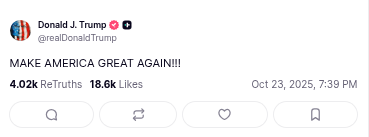
Still Melting. New Day. Same Puddle.
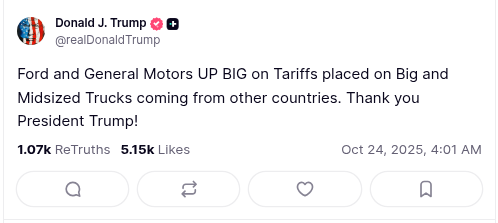
He’s publicly thumping his chest about the very policy the government is quietly un-thumping behind the scenes.
And while he’s out here bragging about how tariffs are saving the auto industry, the actual auto industry is whispering, “Please stop helping us.” The Wall Street Journal reported Thursday that Ford expects tariffs to zap $1 billion from their bottom line next year, and the only reason that number isn’t $2 billion is because the administration expanded tariff relief on imported auto parts.
Retroactively.
Because apparently even the Tariff Toddler knows his toy hammer is smashing his own companies in the face.
Strong sales and lower-than-expected tariff costs propelled Ford Motor’s revenue and operating income well past Wall Street estimates in the third quarter https://t.co/Gv3mfINI8v
— The Wall Street Journal (@WSJ) October 23, 2025
From the Wall Street Journal’s reporting:
Now the company is now looking to benefit from tariff relief and make up for lost vehicle production stemming from a fire at a critical aluminum supplier.
Net income soared to $2.4 billion from $900 million, and shares in Ford rose more than 4% in after-hours trading.
Ford Chief Executive Jim Farley thanked President Trump for expanding tariff relief on imported auto parts while taxing rivals that make medium- and heavy-duty trucks in Mexico or elsewhere.
“We are no longer disadvantaged for building every single one of our Super Duties in the United States,” he said.
[snip]
Ford said Thursday that it expects tariffs to zap $1 billion from its bottom line in 2025, down from the $2 billion hit it projected in July, before the expansion of the relief program. Ford has incurred $1.7 billion in tariffs, so far, but the relief is retroactive, and the benefits will show in the fourth quarter, House said.
WSJ (gift link). 10/23/2025.
And then, at 7:20 AM, he reached the Caps Lock portion of the program, where shouting is supposed to make the wrong parts turn right:
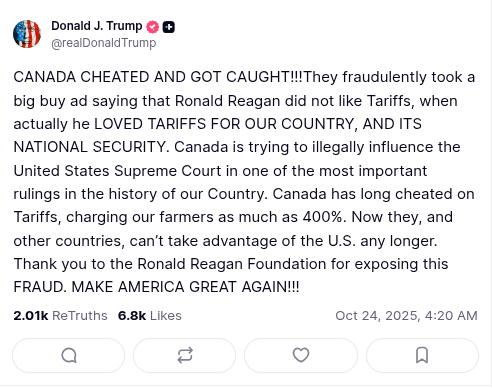
And since nothing says “stable genius” like doubling down before breakfast:
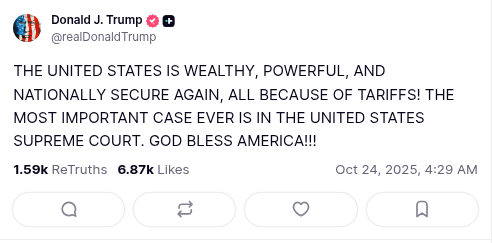
And then we hit the “tariffs are making everything perfect” portion of our morning programming:
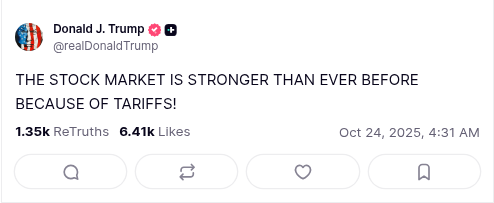
After weeks of delay — yes, it was just one week, but it felt longer — the Bureau of Labor Statistics finally released the CPI for September.
The Consumer Price Index for All Urban Consumers (CPI-U) increased 0.3 percent on a seasonally adjusted basis in September, after rising 0.4 percent in August, the U.S. Bureau of Labor Statistics reported today. Over the last 12 months, the all items index increased 3.0 percent before seasonal adjustment. Note that September CPI data collection was completed before the lapse in appropriations.
The index for gasoline rose 4.1 percent in September and was the largest factor in the all items monthly increase, as the index for energy rose 1.5 percent over the month. The food index increased 0.2 percent over the month as the food at home index rose 0.3 percent and the food away from home index increased 0.1 percent.
The index for all items less food and energy rose 0.2 percent in September, after rising 0.3 percent in each of the 2 preceding months. Indexes that increased over the month include shelter, airline fares, recreation, household furnishings and operations, and apparel. The indexes for motor vehicle insurance, used cars and trucks, and communication were among the few major indexes that decreased in September.
The all items index rose 3.0 percent for the 12 months ending September, after rising 2.9 percent over the 12 months ending August. The all items less food and energy index also rose 3.0 percent over the last 12 months. The energy index increased 2.8 percent for the 12 months ending September. The food index increased 3.1 percent over the last year.
BLS.gov. 10/24/2025.
So Canada tells the truth, Reagan backs them up from the grave, Ford asks for a refund, inflation rolls on, and Baby’s First Trade War is still stomping around insisting he’s king of the sandbox. The tariffs aren’t saving us. They’re exposing him.
